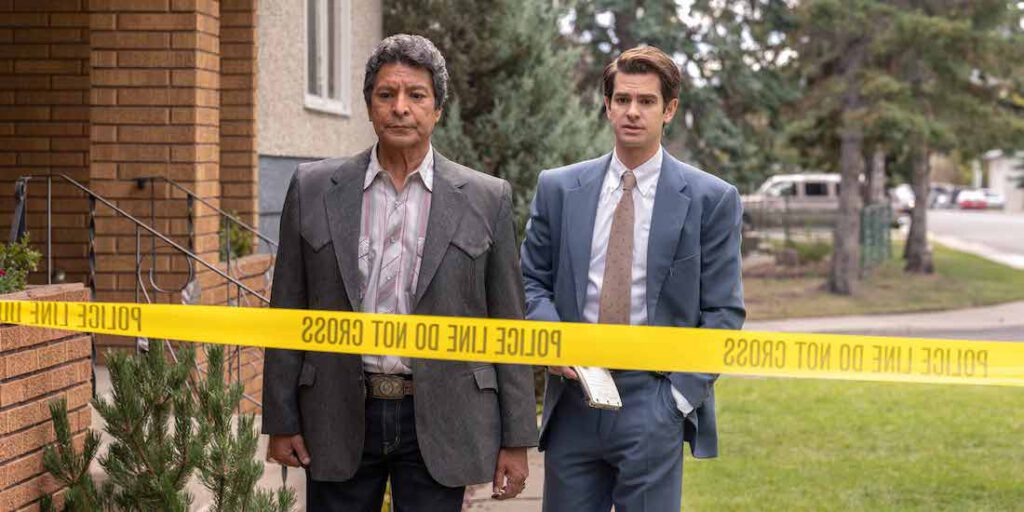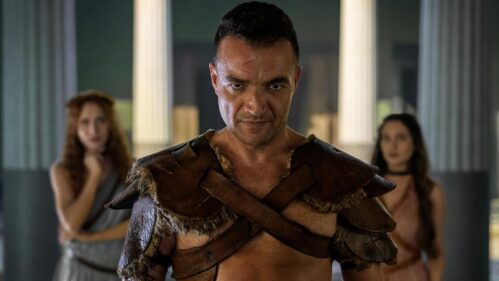Based on the novel by Jon Krakauer and created by Dustin Lance Black, the FX series “Under the Banner of Heaven” concerns a grisly murder in an unlikely place—a heavily Mormon community in Utah, where a cop like Jeb Pyre (Andrew Garfield) says that everyone leaves their doors unlocked. Pyre is one of many devout followers to the visions and whims of Mormonism founder Joseph Smith, which has since fostered tight-knit, wholesome, peaceful, but silencing places like Pyre’s.
The message of Joseph Smith has different meaning to the members of the Lafferty family, whose story turns Black’s series into much more than an in-depth murder investigation, but an American saga of faith, gender roles, and radicalism. Known locally as the Kennedys of Utah, the Laffertys are initially shown as a high-energy, eclectic bunch under the imposing patriarch Ammon (Christopher Heyerdahl), who leads his sons with a tight fist that sometimes has a whipping belt: Ron (Sam Worthington), Dan (Wyatt Russell), Jacob (Taylor St. Pierre), Allen (Billy Howle), Robin (Seth Numrich), and Samuel (Rory Culkin). That masculine intensity is only masked so much when we first meet them, through the eyes of Brenda (Daisy Edgar-Jones), who married into the family via Allen. She is not too ready for the submissive roles that the Lafferty women (played by the likes of Britt Irvin, Chloe Pirrie, Megan Leitch, Michele Wienecke, Denise Gough) have more or less accepted. It’s a calm, outdoor lunch, and the pleasant setting contrasts with how uncomfortable it becomes: the harmonious nature of the Laffertys turns disquieting, and that’s before one brother tells Brenda’s future husband Allen to “mind [his] property.”
In a gripping pilot episode, the present part of the timeline in the early 1980s is chaos. After showing up with blood all over his clothes at the crime scene where his wife Brenda and their 15-month-old baby have been brutally murdered, Allen is quickly taken into police custody. Allen becomes one of many messengers who clues us into the progressively sinister ways of the Laffertys, which started with espousing rebellious anti-government ideals to later preaching about polygamy and embracing fundamentalism. The roads within “Under the Banner of Heaven” are windy and ominous, and learning about former Mormon traditions like a “blood atonement” is just a piece of its shocking true story.

As much as the series concerns the Lafferty family history, charting how their already conservative ways became even more toxic, much of it hinges on Garfield’s performance. He plays one of the most gentle, wholesome cops to have been in a true crime story—perhaps too soft, why is he in this business? But he’s able to talk the quiet talk, with Garfield’s soft voice given a great showcase as he learns more about other family men of his church. As more information comes to light, about the Laffertys but also the history of fundamental Mormonism, the story becomes all the more about him seeing the makings of his whole world perspective. It’s a personal case, with the show’s unique stakes being that of his belief in an institution he seems to have never questioned.
Garfield’s gentle nature brings us into this from the very beginning—the series’ handheld cinematography initially presents him playing with his two daughters on a sunny day. But then he’s called into work. With Jeff Ament’s building score prodding at the moment, we follow Pyre through a gruesome crime scene, noticing shot by shot the blood that has been scattered. Garfield’s face and stillness give us a visceral sense of his dread, of having to approach a point of no return. He doesn’t want to know what horrifying sight is behind a bloodied door to a nursery, but he must confront it head on.
Using its nuanced emphasis on faith, “Under the Banner of Heaven” gradually depicts in extensive flashback how their ways became so monstrous. The performances, however, are sometimes too overzealous in their manic nature—like how Culkin transforms into complete mania and guttural scripture-spewing. (It doesn’t help that by design we don’t see until later the connective tissue of how these changes came to be until into later episodes.) And while Worthington is especially stiff in a role that also calls for him to be gradually monstrous, Wyatt Russell gives the standout performance here. He uses his salesman-ready warmth and sometimes cracking voice to illustrate the growth of thinking, from why he shouldn’t have to pay taxes, to why he should have multiple wives. Like his father, he can readily claim a challenge from Heavenly Father as just more fuel for his destructive fire.
“Under the Banner of Heaven” moves about its expansive story of toxic faith with the rhythm of a true-crime page-turner, thanks to its growing list of witnesses who provide more and more background, and its select moments of action. Courtney Hunt (“Frozen River”) has an assured touch for tense standoffs that end in revealing conversations, and David Mackenzie (“Hell or High Water”) adds fire to scenes that are largely built from police questioning, while creating a robust buddy cop chemistry between Garfield and Birmingham’s unamused, non-religious outsider Bill Taba. Meanwhile the plotting stays tight, motivated by a mystery about the possible suspects seen at Brenda and Allen’s home, along with the uncertainty of where certain Lafferty brothers have vanished to in the modern timeline.

The series is so expansive that it even takes time to recount the history of Joseph Smith, his wife Emma, and the competing prophet Brigham Young, which is told in sizable snippets throughout. Used to complement what the Laffertys have come to believe, these reflections can feel more sinister and eyeopening than the regular History Channel-ready passages they resemble in production value. It’s more that the editing can be overzealous in flashing back between them, as if overemphasizing how these stories all overlap, but disorienting the viewer in the process. It’s easy to imagine “Under the Banner of Heaven” without these moments, or in so much detail. But they prove part of the show’s own wrestling with Mormonism, and its intricate albeit often horrific reckoning with messengers who use the message to serve themselves.
In the midst of this story is Edgar-Jones’ Brenda, sometimes forgotten about in the story’s emotional scope, but a vital voice. Her story, told by Allen in jail, has a more welcome type of radicalism: she went to Brigham Young University with hopes of becoming a TV journalist, she outsmarted creepy professors who then told her only men could read the news, she became a voice of vital reason while the Lafferty men were starting to lose their minds to the gods in their head. Edgar-Jones creates a rich, spirited performance out of a tragedy for how fruitful a progressive mind can be, and similarly how conservative ideals can so readily eat people alive.
“Under the Banner of Heaven” is a mighty busy show, sometimes to the detriment of its many ideas, its many stories, and all those Laffertys. But it is held together by its fascinating, unique way of presenting faith—it’s not as reverential as stories so deep in these communities can be, and it’s also more empathetic to earnest believers like Brenda and Jeb. The show is a gripping investigation in many ways, especially as it preaches the clarity that comes in not being afraid to ask questions.
Five episodes screened for review. “Under the Banner of Heaven” premieres today on FX on Hulu.












